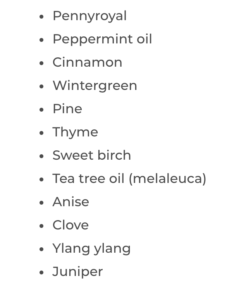The Truth: “Which Essential Oils Are Toxic To Dogs” Lists

Which essential oils are toxic to dogs?
If you’ve ever asked Google or searched pinterest, you probably found a list that looked something like this...

On the surface, these lists appear good... they list enough essential oils to seem complete and not enough to feel overwhelming. There are just right.
However, when you actually know essential oils, and how to use them with animals, these lists are misleading.
Don't get me wrong, I’m glad pet parents are asking what essential oils are bad, harmful, or toxic to their dogs. And I'm really glad they want to keep their pets safe. But these lists can be misleading. For example...
- Any essential oil can be harmful to dogs, cats, or any animal, children, and adults if used incorrectly. The key is knowing the safety issues of the individual essential oils you use and how to use them safely, with yourself and your pets.
- The list doesn’t tell you why the essential oil is harmful. This information is important. When I look at that list I know the safety concerns that put them on the list. Some are skin sensitizers, and not a concern with inhalation, only if you apply topically. Animals benefit greatly from inhalation and unless its a wound or skin irritation, using them topically on the skin just isn’t necessary.
- These lists are incomplete and can give a false sense of what’s safe and what’s not. Most of these lists include 11-14 essential oils. My list of 27 essential oils best avoided by people and pets due to their chemistry. You can grab that list here.
- Plus, there are essential oils that are generally safe to use, but shouldn’t be used with specific conditions like epilepsy, pregnancy, diabetes, or if your dog is having surgery.
Here's the truth about general lists of essential oils... they don't take into account HOW the essential oil is being used.
When a dog chooses an essential oil through self- selection, the essential oil is inhaled, and diluted appropriately at 1%, most essential oils are safe for dogs.
Here's the truth about these so-called "toxic' oils...
Pennyroyal: has several safety concerns, and no reason to use in aromatherapy.
Peppermint: is a skin sensitizer, peppermint is safe for dogs to inhale or use topically in a blend when properly diluted and used in moderation.
Cinnamon: There are 2 types- cinnamon leaf and cinnamon bark. Neither should not be used topically with animals, though cinnamon bark could be safely inhaled when used and diluted appropriately. Avoid or use with caution with cats.
Wintergreen and Sweet Birch: Both are strong skin sensitizers and powerful analgesics and anti-inflammatories. These essential oils have almost identical chemistry. It's best to avoid or use these oils with caution.
Pine: There are several different types of pine are available. Scots pine (pinus sylvestris) is the most common pine oil and is safe for dogs when used appropriately. White pine (Pinus strobus) is softer and a nice option for pets. A few pines have safety issues, so know which species you're using.
Thyme: Several different chemotypes (CT) are available. Thyme CT linalool is the gentlest chemotype and considered the safest to use with animals.
Tea Tree: Contrary to public opinion, tea tree can be used safely with animals when properly diluted and used appropriately. However, there are safer alternatives. (Learn more in my blog post Dogs, Cats, and Tea Tree Essential Oil)
Anise: There is anise seed and anise star and both have safety concerns. Neither need to be used with animals.
Clove: There's clove bud, clove leaf, and clove stem, and all have safety concerns. A powerful antibacterial, anti-viral, and anti-fungal, clove is safe to inhale when self-selected, diluted and used appropriately. Use caution or avoid with cats.
Ylang Ylang: Safe to use for inhalation. In fact, ylang ylang is very helpful for animals with anxiety who lack self-confidence.
Juniper: Juniper Berry (Juniperus communis) is safe to use with animals when used appropriately. There are several juniper species so make sure you have the correct species.
Remember, cats have their own do not use list.
If you use pre-made blends in a diffuser, make sure you know which essential oils- and which species- are in the blend. If any of these harmful or "toxic" essential oils are in the blend, you can choose to not use that blend around your pets, or use it cautiously and watch your pets for adverse reactions.
Still have questions? Email me.
Join my email community and learn more about animal aromatherapy
and other natural remedies for your fur baby... and receive my FREE
Pet Parent's Guide to Diffusing Essential Oils
We hate SPAM. We will never sell your information, for any reason.

